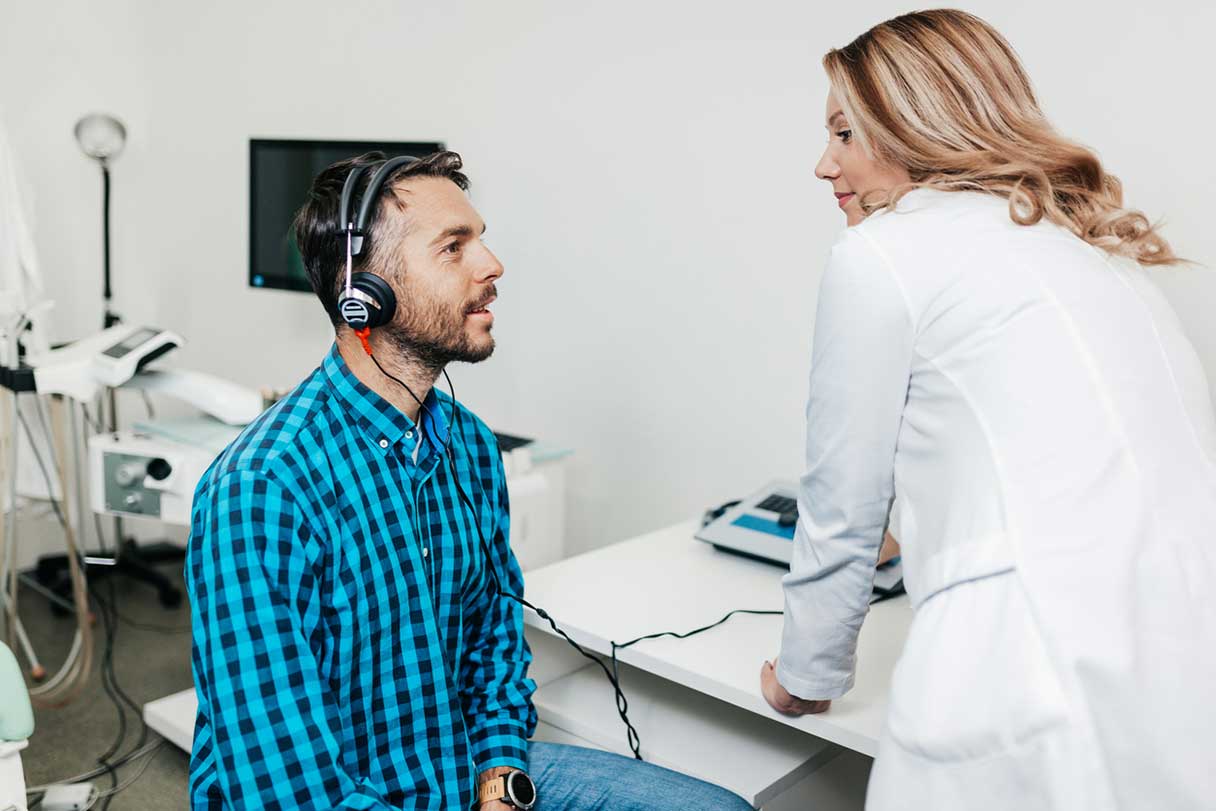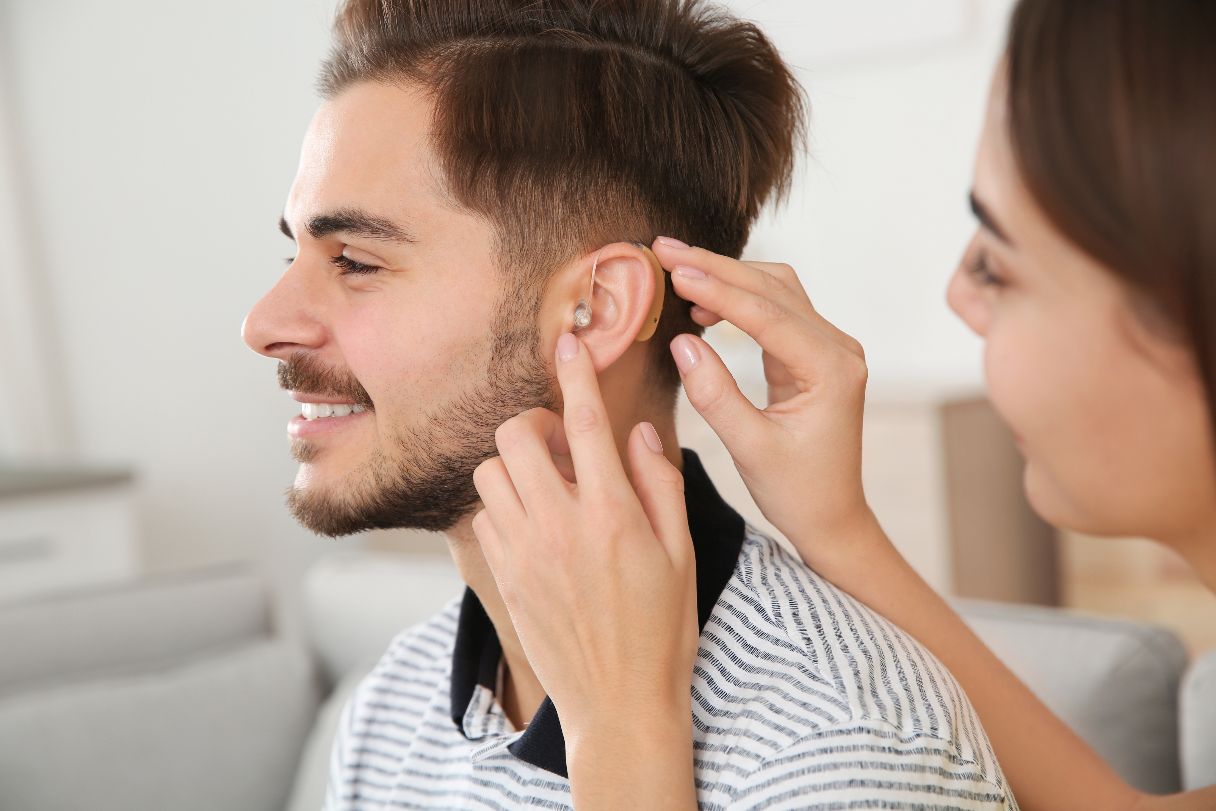Hearing loss shouldn’t be ignored — maintaining good hearing is essential to your overall well-being. However, figuring out which specialist to see for hearing-related issues can be confusing. Audiologists, ear, nose and throat (ENT) doctors and hearing aid specialists each have unique roles in diagnosing and treating hearing loss and ear-related concerns.1
If you are experiencing hearing challenges, want to improve your auditory health or wish to proactively protect against hearing loss but don’t know where to start, this guide is for you. Here, you’ll learn about the distinct roles of each hearing expert so you can make an informed decision and support your journey to better hearing.
Hearing Care Providers: A Quick Overview
Today, hearing technology is making incredible strides, but finding the right hearing specialist and knowing when to seek their guidance is equally important. Take a look at this overview, which explains what each provider does:1
| Professional | Key responsibilities | Differences |
|---|---|---|
| Audiologist |
|
Doesn't provide surgical support or prescribe medications3 |
| ENT specialist |
|
Doesn't provide routine care or maintenance for hearing aid devices |
| Hearing aid specialist |
|
Doesn't provide medical/surgical care or prescribe devices or medications4 |
Learn More
Find a Provider Near You
Who Should You See? A Situational Guide
A primary care provider may be the first point of contact when you're experiencing hearing loss or ear-related issues. Based on their findings, they may refer you to a specialist, such as an audiologist or an ENT for comprehensive testing and tailored treatment options.1
The referral process may be required for insurance coverage and helps ensure that you receive the most appropriate care based on your specific situation, whether it involves diagnosing the type of hearing loss, exploring treatment options or managing underlying medical conditions affecting ear health.
When to see an audiologist
Audiologists diagnose and treat hearing and balance disorders.3 They hold advanced degrees, such as a doctorate or master’s in audiology, and use specialized tools to test for hearing loss, balance problems and related conditions.1
Your audiologist will be able to prescribe aural rehabilitation, which is a process designed to help minimize the negative impacts of hearing loss and improve your overall quality of life. It encompasses a range of strategies and therapies, including hearing aid fitting and management, communication strategies training, auditory training to improve listening skills, speechreading (lipreading) instruction, counseling to address emotional and social challenges and environmental modifications to optimize listening environments.2
You might see an audiologist when:3
- You experience tinnitus or have balance issues
- You need a hearing test1
- You need to determine what hearing aid is right for you1
- You notice hearing loss, especially if it's not dramatic and sudden
When to see an ENT doctor
An ENT is a medical doctor who can prescribe medicine and perform surgeries like cochlear implants if needed.4 ENT specialists diagnose and treat problems involving the ear, nose, throat and neck — which can range from trauma and tumors to disease and even allergies.3 They can also order diagnostic tests, such as CT or MRI scans and more.4
You might see an ENT specialist when:3
- An audiologist or a primary care doctor can't identify the cause of hearing loss
- You had an infection or injury preceding hearing loss
- You have pain or unusual drainage in the ear4
- You have sudden hearing loss
- You need prescription medication or surgery
- You're experiencing balance issues like vertigo or tinnitus4
When to see a hearing aid specialist
Hearing aid specialists, also called hearing instrument specialists, focus on selecting, fitting and maintaining hearing aids. They work with patients who have been diagnosed with hearing loss and who need assistive devices.4
While they require certification or licensing, their training is less extensive than that of audiologists or ENT specialists.1 Hearing aid specialists do not diagnose hearing loss or treat medical conditions but provide technical support for hearing devices.4
You might see a hearing aid specialist if:4
- You already saw a doctor who said you needed hearing aids
- You have mild hearing loss
- You want to buy hearing aids or need help fixing a current pair of hearing aids
Collaborative care
In hearing loss care, a multidisciplinary team approach involves health professionals such as primary care physicians, audiologists, ENT specialists and hearing aid experts collaborating to deliver comprehensive and coordinated care. Each expert contributes their knowledge to create a treatment plan that is best for you. A team approach may be ideal if you have a complex medical history or take multiple medications.
For example, a person experiencing gradual hearing loss may first visit their primary care physician, who assesses their overall health and refers them to an audiologist for a hearing test.1 The audiologist may confirm moderate sensorineural hearing loss and then collaborate with an ENT specialist to rule out any underlying medical conditions.3 Once cleared, a hearing aid specialist could help select and fit the right device.1 Throughout the process, these professionals would communicate and share information to help ensure treatment plans account for prior medical history, medications and lifestyle. A team-based approach like this is especially valuable for individuals with complex health needs to help ensure no aspect of care is overlooked.
Your Hearing Health Matters
Everyone deserves to be heard and understood, to communicate and connect. When you can hear clearly, it's easier to chime in and feel confident sharing with others. Whether you're interested in evaluating, protecting or improving your hearing, it's important to know which hearing specialist can help you understand what type of hearing loss you have and the best solutions available.
Frequently Asked Questions
Do you still have questions? Below are commonly asked questions and answers about hearing loss professionals and related issues.
Financing Ear Care With the CareCredit Credit Card
The CareCredit credit card can help you pay for hearing care, including regular
hearing tests, screenings and more.* Use our Acceptance Locator to find a hearing specialist near you that accepts CareCredit. Continue to invest in your wellness journey by downloading the CareCredit Mobile App to manage your account, find a provider on the go and easily access the Well U blog for more great articles, podcasts and videos.
In addition to hearing care, you can also use your CareCredit credit card for dentistry, cosmetic, pet care, vision, health systems, dermatology, pharmacy purchases, spa treatments and so much more within the CareCredit network. How will you invest in your health and wellness next?
Author Bio
Pamela Cagle, R.N., has extensive experience in a range of clinical settings, including ER, surgical and cardiovascular. For the past decade, she has leveraged her nursing experience in writing for health and technology publications such as AARP, VKTR, National Council on Aging and others. She is passionate about blending her medical and storytelling expertise to bring authenticity to health and wellness topics.








